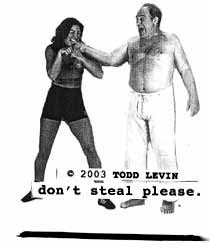


|
|
MARCO POLO. I'm here to tell you it's simply not worth it. Last night I had a lot of activity to squeeze in - miles to go before I slept, or at least passed-out. I wanted to go home, to the gymnasium (brag), and back out to Manhattan where I'd started my day, in order to meet friends for drinks (brag) later that night. There was no time for dinner at home, so I was required to grab food on the run. Because exercise is one of the rare occasions when my body craves clean proteins over cheese-covered salt licks, I had my mind set on sushi (international brag). Arriving at Tonbo, my new favorite Japanese hole-in-the-wall, I did something I've never done before: I took a seat right at the sushi bar. (actually, i did two things i'd never done before. this was also the first time i'd ever eaten dinner at a restaurant by myself. it was a very edward hopper moment for me.) I have always believed that the sushi bar is a Japanese restaurant's equivalent of a VIP room. You are afforded a great, clear view of the fish and how it is prepared. You can police the sushi chef, making sure he doesn't pee in your vinegar-rice. I always expected people seated at the sushi bar were endowed with all manner of culinary privileges - hidden fish recommendations, free tastings, arranged marriages, happy endings, etc. I also expected that, for Americans, it was a great place to make subtle insinuations. "See how much better I am than those other Americans at the booths, with their California Rolls and Sukiyaki. They make us sick. I am different from them. I am just like you. I love Japan. I love squid-flavored gum and my ancestors and pornographic images of women fucking a pan filled with vomit. And, just to prove our kinship and my authenticity, I will now order something totally alien to American palates." Feeling a ridiculous need to earn my seat, I proudly declared my intentions: I would like to eat some natto, please. Natto is - in its most simple definition - a form of fermented soybeans. It is often referred to as "the Japanese cheese", not because of its flavor or texture but by nature of the fact that it achieves its character through the cultivation of certain potentially harmful bacteria. Some say it provides many of the nutrients lacking in a typical vegetarian diet, and is also known to possess several curative qualities. Natto is a natural blood thinner and has been linked informally to the prevention of heart disease, intestinal disorders, strokes, senility, cancer, and osteoporosis. It is believed to be helpful in slowing the effects of aging, and some people use it to maintain health in their pets. The official Natto web site, "Natto for Everybody", even includes a supportive cheer for this national dietary treasure: "Let's Eat Natto Once A Day!! Let's Make Natto Once A Month!!" How can you go wrong with a food that has its own cheer? Lettuce doesn't have a cheer. And the cheer my father wrote for meat loaf ¬ "I'd better see you stuffing meat loaf into your food hole by the time I count to "belt!" ¬ lacks some of the can-do spirit of "let's eat natto once a day!" I saw "MAGURO NATTO" on the menu - a combination of natto and raw tuna - and thought this would be a great introduction to the dish that had alluded me for reasons of momentary self-preservation. (a friend once described natto as "an acquired taste". when something is described in that manner it usually means "you will curse the day you ordered this.") I assumed maguro natto was some sort of roll combining the tuna and natto, and felt confident that the rice, seaweed, soy sauce and fish would all work in concert to serve as a buffer against the terrible taste of the (no doubt small amount of) natto contained within. When the sushi chef heard me order this dish, and then witnessed me bowing reverently at the waiter (and then again at a busboy, and once more at a ceramic kitten), his face lit up. "You like natto?" he asked. I explained that I'm learning to like it. (not a complete lie, though it could have been worded differently.) He seemed surprised and impressed, and responded, "Americans don't like. Very Japanese taste." I nodded, and bowed to a small display of white fish on the sushi bar. The chef then began preparing a small salad of octopus, cucumber, seaweed, and vinegar, and offered it to me, his new Nipponese friend. Free octopus! I was completely in. Why hadn't I thought of this sooner? I considered all the wonderful dishes and human interaction I'd been missing in my many years eating at tables and booths, and shook my head as I enjoyed my delicious (FREE) salad. In mid-bite, I saw the natto being prepared. It was not a little natto; it was a lot of natto. A whole lot. A giant fucking bowl of it, in fact, blanketing the pieces of tuna beneath it. There was no rice or seaweed wrapper in sight. The only thing he was adding to this heaping portion of natto, besides a traditional sauce and mustard, was one RAW EGG. A self-contained salmonella bomb being dropped right into a dish I never should have ordered in the first place. But I steadied myself, waiting for the natto to cure every malady and personal inadequacy with each loving bite. It's a national dish; how bad could this be? Since natto has so many medicinal and health advantages, one might wonder why it isn't more popular. Why, in fact, isn't natto eaten with every meal, regardless of national borders? Simple: natto tastes like dog shit. Or, more specifically, natto smells like well-traveled feet and tastes almost exactly like two fingers being crammed down your throat. And those fingers were, of course, covered in dog shit. Its preparation requires some serious bacteria, and if utensils are not properly sterilized the entire process could go woefully wrong at any juncture. The final result produces a pile of slick, softened soybeans that leave a thin, stringy trail when separated. Yum. Natto is often the food that divides people who like chicken tempura from people who are either A) Japanese, B) Cosmopolitan, C) Nutritionally Adventurous, or D) Desperately trying to please. Guess which one I was? So my reward was a king's bounty of smelly, stringy, natto-covered tuna sitting before me. The yolk of the egg was left perfectly intact in the center of the bowl, staring me down like a dare. The chef smiled beatifically (i made that up - every writer, at least once in his life, is required to use the phrase "smiled beatifically". i have served my obligation, and now i may continue.), encouraging my inevitable enjoyment of this foul dish. Suddenly I realized how totally fucked you are when you sit at the sushi bar. My sense of privilege, which I felt drain from my face, was quickly replaced by ashen horror. Not only did I have to try this natto, I was sure I had to eat every last rank drop if I wanted to avoid being disrespectful of the chef's craft. Privately, I knew the stakes were even higher; rejecting even a single moldy bean would mean revealing myself as the phony I most surely was. It would cast doubt over every false construction I'd engineered in the last few minutes - my incessant bowing, my overseas travel, the multitude of karate championships I'd won, the tea trade, the hara-kiri scars, my over-enunciated request for "please one more nappa-KIN, most honorable sir". All of my studied jingoism would be a complete waste. So I ate. I tried to clean my whole goddamn plate. As I pinched and lifted serving after serving of natto, trying desperately not to breathe, I could feel the barely chewed bites expanding grotesquely inside my mouth. I tried to supplement each mouthful with alternating gulps of beer and water, letting the liquid rest in my mouth with the natto to curtail its rapid swelling and de-centralize the sensual assault as much as possible. Occasionally, when the chopsticks were pulled away from my lips they would leave a stow-away trail of egg white and mold that dangled precariously between the business end of the utensil and my quivering, blanched lips. (in this particular moment, i'm sincerely disappointed that the video art of matthew barney isn't a more universal analogy, because the sticky trails attached to the natto, to my chopsticks, and to my face bore an uncanny resemblance to the gooey, air-clouded petroleum jelly that covers nearly every surface in barney's films. too bad for all of us.) In the end there were only a few stray natto orphans remaining. I did not feel victorious, nor did I feel more down with Japanese culture in any way. What I did feel were the immediate effects of natto's magical blood thinning performance. All of the blood that was formerly in my head was now in my knees, which swayed and buckled like buoys as I excused myself from the seat and headed to the bathroom to bow once last time.
|
